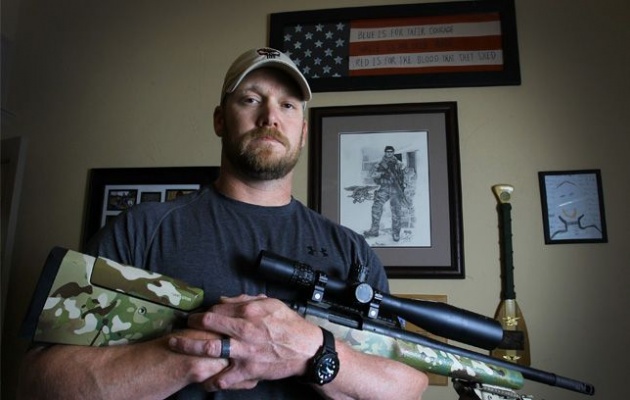The American Sniper Didn't Have to Die
A lot of guys confuse the liquor cabinet for a medicine cabinet. They mistake a bartender for a shrink. And they can’t tell the difference between getting a good buzz and wearing blinders against stuff that really scares them.
Tell me if this one sounds familiar: You have a tough day at work, or your girlfriend is on your case, so instead of confronting your boss or working through the difficulties head-on, you pour yourself some solace instead. And after a few gulps of alcohol, the office feels like a distant annoyance, and that high-pitched whine from your girlfriend is buried under white noise. It couldn’t be more convenient. The intoxicants are readily available and socially acceptable, and they’re so much easier to manage than the problem itself.
Tons of guys use intoxicants to quiet mental noise, to blur the sharp outlines of a life that might be cutting them down. It’s called self-medication, and far too many guys are operating as their own Dr. Feelgoods. But if Dr. Feelgood were an actual M.D., his license would have been revoked long ago.

I’m thinking about this a lot right now, as I follow the details of the trial of Eddie Routh, the man who gunned down theAmerican Sniper hero Chris Kyle and his friend Chad Littlefield. Men’s Health has been part of the national coverage of Kyle and Routh, because of the exclusive reporting our contributing editor Laura Beil did on the case.
Her Men’s Health story—now an e-book bestseller, The Enemy Within—came together after Laura was able to convince Eddie Routh’s family and girlfriend to speak with her about a son and a lover who returned from Iraq and Haiti and spiraled out of control. Because of a gag-order that was imposed during the pre-trial period, Laura was the last journalist who spoke with Eddie’s loved ones.
It’s hard to remember it now, after Routh brought down the deadliest sniper in military history with five shots in the back, but he was also a kind of hero, once, too—a high-school athlete who wanted to serve his country just as badly as Chris Kyle did. He became a Marine, and went places you and I don’t have to go, because Eddie Routh went there with our military forces, on our behalf. For a time, it gave Eddie a purpose in life. And then it destroyed it.
In the movie American Sniper, there’s a dramatic scene where Kyle watches from his roof-top position as an 11-year-old boy tries to hoist a grenade launcher onto his shoulder, to fire at an American convoy. Bradley Cooper, who brilliantly played Kyle on film, pleads with the boy—from a quarter-mile away—to drop the gun so he won’t have to kill him.
(See How Bradley Cooper Gained 40 Pounds to portray Kyle in American Sniper.)
Ultimately, it was experiences like that that drove the real Chris Kyle, a father, to quit the military, and try to rejoin his wife and family. But it was also his sympathy for that sort of suffering that led him to reach out to veterans through his foundation, to provide them with physical training and workout gear. And because of that work, Eddie Routh’s mother reached out to Kyle, for help with her son.
Eddie Routh suffered from his experiences, as well. He told his mother and girlfriend harrowing stories of the time after the 2010 earthquake in Haiti, when he and other members of the U.S. military were asked to clean up the human wreckage of a natural disaster. Most of us only have to deal with the kinds of nightmares we can wake up from and shake off. Eddie Routhlived his, and the memories were indelible. When he returned to the U.S., he began a spiral into mental illness that was made worse, not better, by the medications doled out to him by Veterans Administration doctors. He couldn’t bear the side effects, so he also turned to self-medication—with marijuana and alcohol.
It’s one of the many sad ironies of his ill-fated encounter with Chris Kyle on February 2, 2013, that both veterans were on drugs meant to restore their mental balance. And both men had been arrested for drunk driving after their military gigs were up. They were both struggling with how to reconstruct their lives back home, when they had seen so much—too much—during their time in the military. Both turned to a drug and alcohol cocktail, in an attempt to get their minds right.
Eddie’s story wouldn’t make for a good movie. He was simply a dark shadow at the end of American Sniper. After his trial, he’ll be confined either to a mental hospital or jail for the rest of his life, to keep him from doing any more harm.
But most of us have a lot more in common with Eddie than we do with Chris. The American Sniper was highly skilled, a hero, and his legend lives on. Eddie suffered, quietly at first, and tried to shut out disturbing voices with drugs and alcohol. He failed, tragically.
The rest of us aren’t facing his level of mental illness, but too often, our strategies are the same. To try to blunt the voices, to plug our ears, to numb the pain, rather than listening harder, and finding out exactly where it hurts, and why. Drugs and alcohol won’t help with that process, but a shot of honesty, and a dose of self-knowledge, just might.



